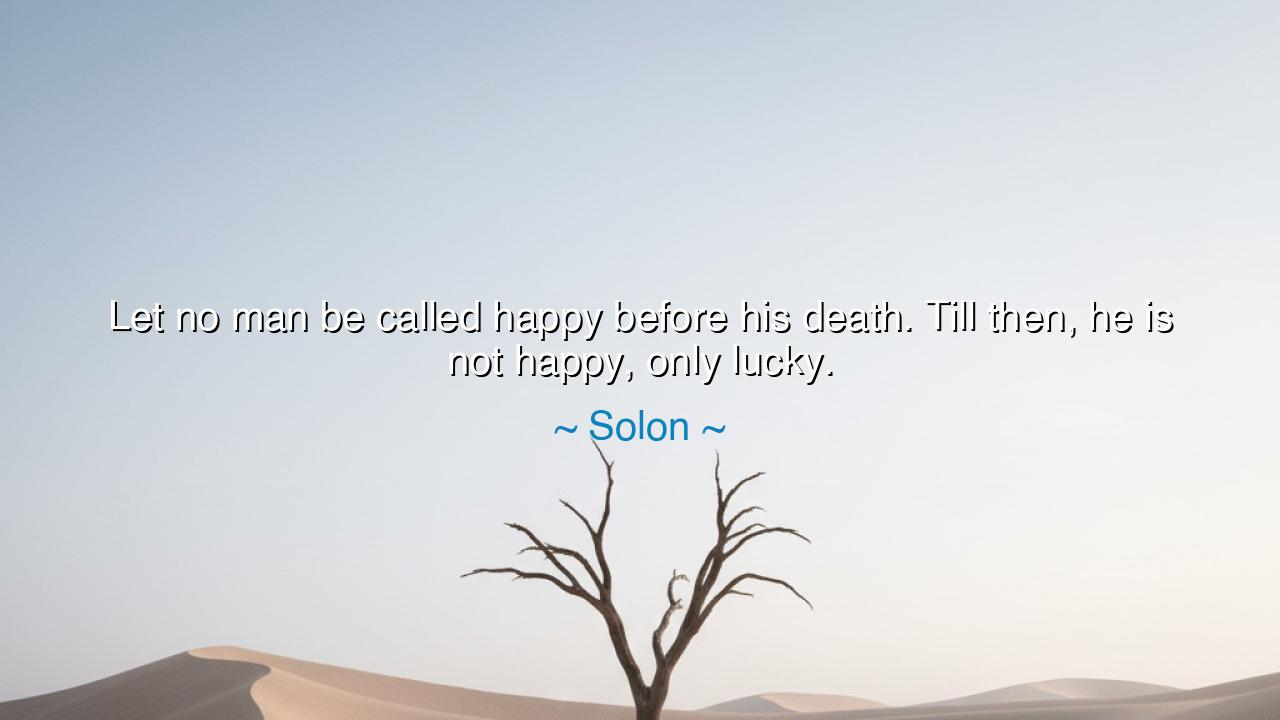
Let no man be called happy before his death. Till then, he is not






The wise Athenian lawgiver Solon once declared: “Let no man be called happy before his death. Till then, he is not happy, only lucky.” These words, forged in the dawn of Greek civilization, ring with the clarity of eternal truth. They remind us that the measure of a life cannot be taken in its beginning, nor in its middle, but only when its end has come and its story is complete. For until the final day, the winds of fate still blow, and fortune — ever fickle, ever changing — may lift a man to the heavens one moment and cast him into ruin the next. Solon’s wisdom is not a denial of joy, but a call to humility, to perspective, and to the recognition that true happiness lies not in circumstance, but in the harmony of a well-lived life.
The origin of this saying lies in Solon’s encounter with Croesus, the fabled king of Lydia, famed throughout the ancient world for his immeasurable wealth. Croesus, proud of his power and possessions, asked Solon — who had come to visit his court — if he was not the happiest man alive. Solon, unshaken by the splendor around him, answered instead with tales of humble men who had lived with honor, died with dignity, and left behind noble legacies. When the king pressed him further, Solon replied with this immortal truth: “Call no man happy until he is dead.” Croesus, offended and disbelieving, soon learned the meaning of those words when fortune turned against him — his empire fell, his sons were lost, and he himself stood upon the pyre, awaiting execution. Only then, in his suffering, did he remember the sage’s warning. And when mercy finally spared him, Croesus knew that Solon had spoken not to wound his pride, but to awaken his wisdom.
Solon’s teaching pierces to the heart of human arrogance. Men are quick to call themselves blessed when fortune smiles, when their houses are full, and their names are praised. Yet how many have we seen rise high only to fall in shame? Happiness, Solon reminds us, is not the possession of wealth, nor the ease of comfort, nor even the fleeting joy of triumph. These are but the gifts of luck, scattered by the hand of fate, which can be withdrawn as swiftly as they are given. To call oneself happy while life is still unfolding is to mistake the dawn for the full light of day. True happiness is known only at the end — when one can look back upon a life of virtue, integrity, and peace, unmarred by regret.
The ancients understood that life is a drama, not a snapshot. Its worth cannot be judged by a single act, but by the whole play. Solon’s wisdom echoes through the ages because it speaks to the fragile, shifting nature of human existence. Even the greatest heroes of myth — Achilles, Oedipus, Agamemnon — were not spared tragedy, though glory once shone upon them. Their tales are reminders that the favor of the gods is uncertain, and that no mortal can claim happiness until he has passed beyond the reach of fortune’s wheel. Death, in this sense, is not merely an end, but a seal — the moment when a man’s character and deeds can finally be weighed and known.
Consider the story of Abraham Lincoln, whose life mirrors Solon’s teaching. Throughout his years, Lincoln knew both triumph and torment — from the presidency that freed a nation to the deep personal sorrow of war and loss. In his own time, he was ridiculed, opposed, and often despairing. Yet only after his death did the world come to see the full measure of his greatness. His life, marked by humility and purpose, achieved its true meaning only when it was complete. So it is with all who live well: happiness is not found in the fleeting comforts of the present, but in the legacy of one’s life, judged in its wholeness.
This wisdom carries a profound lesson for us all. Do not chase happiness as if it were a treasure buried in the next moment. Live instead with virtue, courage, and compassion, knowing that every choice shapes the final story of your soul. Do not boast in fortune, nor despair in hardship, for neither defines you — they are but seasons in the greater cycle of your life. What endures is not what you possessed, but what you became. To live rightly, then, is to prepare for the final judgment not of men, but of time itself.
So, my listener, take Solon’s words to heart: “Let no man be called happy before his death.” Live not in pride, but in gratitude; not in vanity, but in wisdom. Let your happiness be built upon deeds, not dreams; upon virtue, not chance. For the tides of fortune will rise and fall, but the soul that walks in truth will remain unmoved. And when your final day comes — when your story is written in full — may it be said not that you were lucky, but that you were truly happy, because you lived with honor until the very end.






AAdministratorAdministrator
Welcome, honored guests. Please leave a comment, we will respond soon